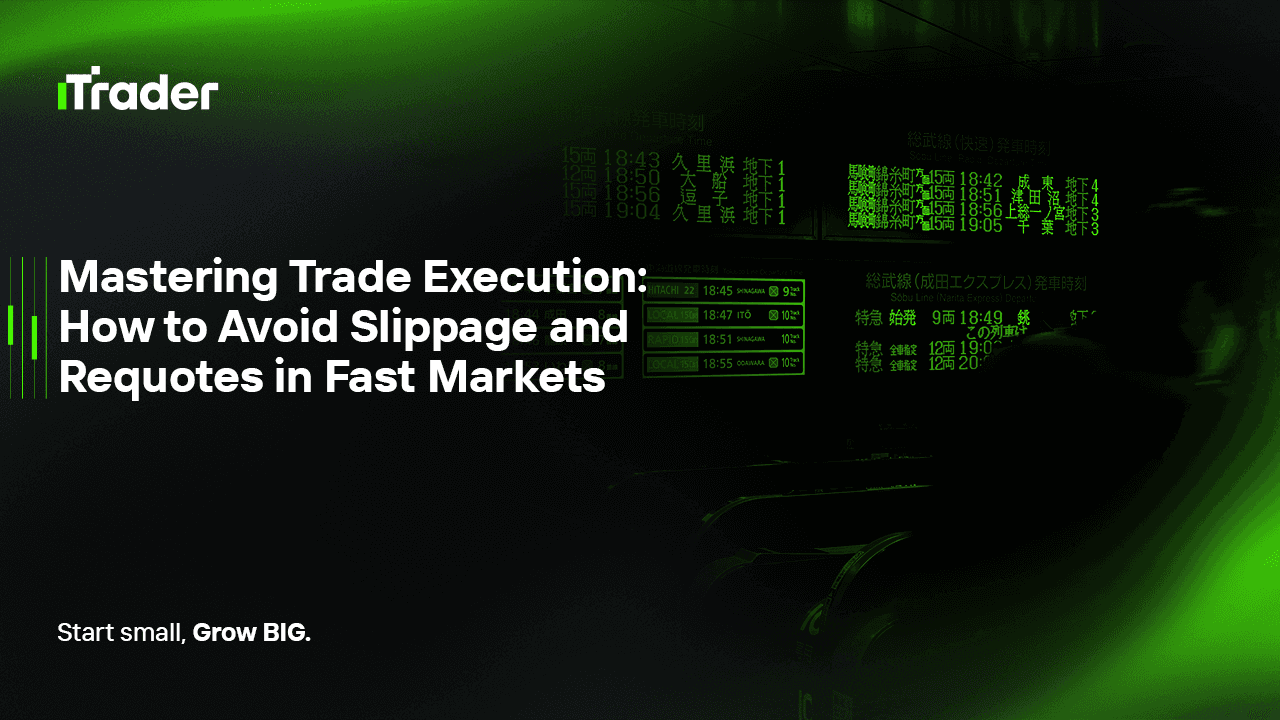2025-09-22
Every trader knows the feeling: you spot the setup, hit the buy button, and then… your entry isn’t where you expected. The market moved a little, your broker slipped the order, or worse—they sent you a requote. Suddenly your risk looks bigger, your reward-to-risk ratio is skewed, and frustration creeps in.
For retail traders this might be an annoyance, but for prop traders it’s a different story. Slippage and requotes can be the difference between passing or failing an evaluation. When a firm sets strict drawdown rules, even small execution errors matter.

In this blog, we’ll break down what slippage and requotes really are, why they hit prop traders harder, and what you can actually do to manage them. Think of it as a trader-to-trader conversation about one of the least glamorous but most important parts of the game: getting filled at the right price.
Execution isn’t just clicking “Buy” or “Sell.” It’s the whole chain:
Along that chain, two things can happen:
If you’ve ever traded around big news events, you’ve definitely seen one—or both.
Slippage is simply the gap between your intended price and your actual fill.
Example: You buy EUR/USD at 1.1000. Instead of 1.1000, you get filled at 1.1003. That’s a 3-pip slippage against you.
A requote is when your broker says: “Sorry, we can’t fill you at that price. Here’s a new one—do you want it?”
Example: You try to buy GBP/USD at 1.2500. The broker responds: “New available price: 1.2505.” You must accept or cancel.
Requotes are most common with dealing desk brokers, especially when markets are moving fast. They’re frustrating because they interrupt your flow—you either chase the market or miss the trade.
For a retail trader, slippage and requotes just eat into profit margins. For a prop trader, they can break the rules of the game.
That’s why execution quality is part of being a professional. Strategy alone isn’t enough.
Here’s the truth: you’ll never fully escape slippage. It’s part of trading. What matters is how you prepare for it and respond when it happens.
The traders who survive in prop aren’t the ones with zero slippage—they’re the ones who accept it and keep their discipline intact.
Execution isn’t just a technical detail—it’s part of risk management.
Picture this: it’s Nonfarm Payroll Friday. Your system calls for a breakout buy at 1.0800 in EUR/USD.
For many traders, this kind of slippage is enough to break a prop evaluation. The smart play? Sit out unless your system is specifically designed for that chaos.
Good traders measure everything—including execution.
Execution data is part of your trading edge. Ignore it, and you’re trading blind.
Slippage and requotes aren’t glamorous topics. They don’t show up in flashy strategy backtests. But for prop traders, they’re deal-makers or deal-breakers.
You can’t eliminate them, but you can manage them. The keys are:
Prop firms don’t expect perfection—they expect professionalism. Managing execution is part of proving you’re ready to handle real capital.
© 2025 iTrader Global Limited | Số đăng ký công ty: 15962
iTrader Global Limited có trụ sở tại Hamchako, Mutsamudu, Đảo tự trị Anjouan, Liên bang Comoros và được cấp phép, quản lý bởi Ủy ban Chứng khoán Comoros. Giấy phép số: L15962/ITGL.
iTrader Global Limited hoạt động dưới tên thương mại “iTrader” và được cấp quyền thực hiện các hoạt động giao dịch ngoại hối. Logo, thương hiệu và trang web của công ty là tài sản độc quyền của iTrader Global Limited.
Các công ty con khác của iTrader Global Limited bao gồm: iTrader Global Pty Ltd, số đăng ký công ty tại Úc (ACN): 686 857 198. Công ty này là đại diện được ủy quyền (số đại diện AFS: 001315037) của Opheleo Holdings Pty Ltd (giấy phép dịch vụ tài chính Úc AFSL: 000224485), có địa chỉ đăng ký tại: Tầng 1, số 256 đường Rundle, Adelaide, SA 5000.
Tuyên bố miễn trừ trách nhiệm: Công ty này không phải là tổ chức phát hành và không chịu trách nhiệm đối với các sản phẩm tài chính được giao dịch trên hoặc thông qua trang web này.
Cảnh báo rủi ro: Giao dịch CFD có mức độ rủi ro cao do đòn bẩy và có thể dẫn đến mất vốn nhanh chóng, không phù hợp với tất cả người dùng.
Giao dịch quỹ, CFD và các sản phẩm có đòn bẩy cao khác đòi hỏi kiến thức chuyên môn.
Nghiên cứu cho thấy 84,01% nhà giao dịch sử dụng đòn bẩy bị thua lỗ. Hãy đảm bảo rằng bạn hiểu rõ rủi ro và sẵn sàng chấp nhận mất toàn bộ số vốn trước khi giao dịch.
iTrader tuyên bố rằng họ sẽ không chịu trách nhiệm đầy đủ đối với bất kỳ rủi ro, tổn thất hoặc thiệt hại nào phát sinh từ hoạt động giao dịch có đòn bẩy, dù là đối với cá nhân hay pháp nhân.
Hạn chế sử dụng: iTrader không cung cấp trang web hoặc dịch vụ cho cư dân tại các quốc gia nơi hoạt động này bị cấm bởi pháp luật, quy định hoặc chính sách.